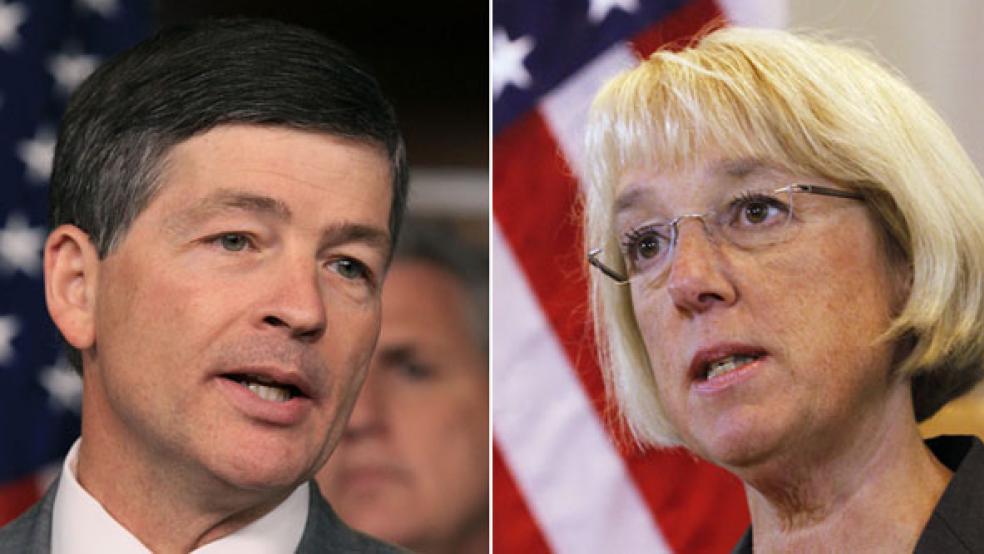Sen. Patty Murray and Rep. Jeb Hensarling come from different parties, different political philosophies, different genders and different backgrounds. Murray, D-Wash., and Hensarling, R-Texas, even campaigned for Congress differently – Murray as the outsider “mom in tennis shoes,” and Hensarling as the consummate insider, who cut his teeth on the staff of former Sen. Phil Gramm, the free-market Democrat turned Republican who co-authored a budget balancing act in the 1980s.
But they do have one thing in common, and it will only accentuate their differences. Both are leaders of their parties. And as they set out on the task of leading the congressional “super committee” that must identify $1.2 trillion in deficit reduction or watch automatic cuts kick in, both will be looking out for the interests of their colleagues who are already focused on the 2012 congressional elections.
Murray heads the Democratic Senate Campaign Committee, which is charged with electing Democrats. And Hensarling is the GOP conference chairman, a job that includes setting legislative priorities for a House that has veered far to the right in the wake of its 2010 triumph in the mid-term election.
Both have offered conciliatory statements in the early going. But the relationship will soon become contentious, especially as the committee’s deliberations near the December deadline.
The Challenges of Finding ‘Common Values’
Shortly after being named to lead the Democrats on the panel, Murray asked for public patience, telling a group of reporters that the members need “to look each other in the eyes and find common values that we have to move forward.” Hensarling, who will head the Republicans, told the Washington Post that it’s “more important to get it done right than to get it done quickly.”
Analysts suggest that finding common ground will be difficult. Jack Pitney, political science professor at Claremont-McKenna College, said, “Both would agree we should cut waste, fraud and abuse, [but] all politicians agree on that.” And deciding what fits that description is where all politicians diverge.
Terry Madonna, professor of political science at Franklin and Marshall University, said Murray has not previously shown any desire to cut entitlement programs like Medicare and Medicaid, which might be necessary to achieve compromise. “At the moment, Republicans do worse [in polls] on who gets the most blame [for the deficit problem],” Madonna said. “I think the question you have to answer is, if the deal collapses, does that hurt her? There’s no compelling reason for her to move too far away from where the Democrats are right now.”
Experts say the outlook is even bleaker for compromise on Hensarling’s side. “He has no history of being able to cut the kind of deal we need at this point,” said Southern Methodist University (Texas) political science Prof. Cal Jillson. “He comes off Phil Gramm’s staff. Phil Gramm was always able to make a deal… That’s where Jeb Hensarling is different. He so far has demonstrated no ability to get to the late innings of the game, step back from his principles and take a clear win.”
Hensarling, 53, voted against the financial system bailout in 2008 and against the deficit reduction proposal of the Bowles-Simpson commission, on which he sat. He showed no reluctance to take on President Obama during the President’s appearance at a GOP conference meeting in 2010, prompting the President to accuse Hensarling of creating campaign talking points.
After working for Gramm, Hensarling entered politics on his own with the aim of taking Gramm’s place as the nation’s “budget nanny.” While the budget was never a sexy issue, it grew in importance as the deficit problem worsened in the wake of the Great Recession.
Murray, 60, entered the Senate in 1992 in what became known as the “year of the woman.” She got into politics after a state legislator, arguing with her over cuts to the education budget, derided her as “just a mom in tennis shoes.” She turned the slogan into a winning one for her subsequent campaigns.
With a decidedly liberal record, she has grown to become one of the most powerful Democrats in the Senate. She was one of 21 Senate Democrats who voted in 2002 against authorization for the war in Iraq. She clearly has the ear of Majority Leader Harry Reid. But as chair of the Democratic Senatorial Campaign Committee, she has her work cut out for her as Democrats are defending a record 23 seats in what is shaping up as a tough year.
She was front and center during the debt ceiling debates in July and said at the conclusion of the debate – a conclusion that led to the formation of the super committee – that the most important thing now is to concentrate on the “infrastructure deficit, an education and skills-training deficit and a jobs deficit.” Finding resources for those priorities will be difficult when the other side is intent on keeping higher taxes off the table.
For his part, Hensarling has strictly adhered to the GOP pledge not to raise taxes as part of a grand deal. Again, that’s hardly a prescription for making deficit-reduction the priority. “A deal would enhance the reputation of both players, but a Beltway reputation doesn’t do you much good if you lose your political base at home,” said Jack Pitney of Claremont-McKenna College.




